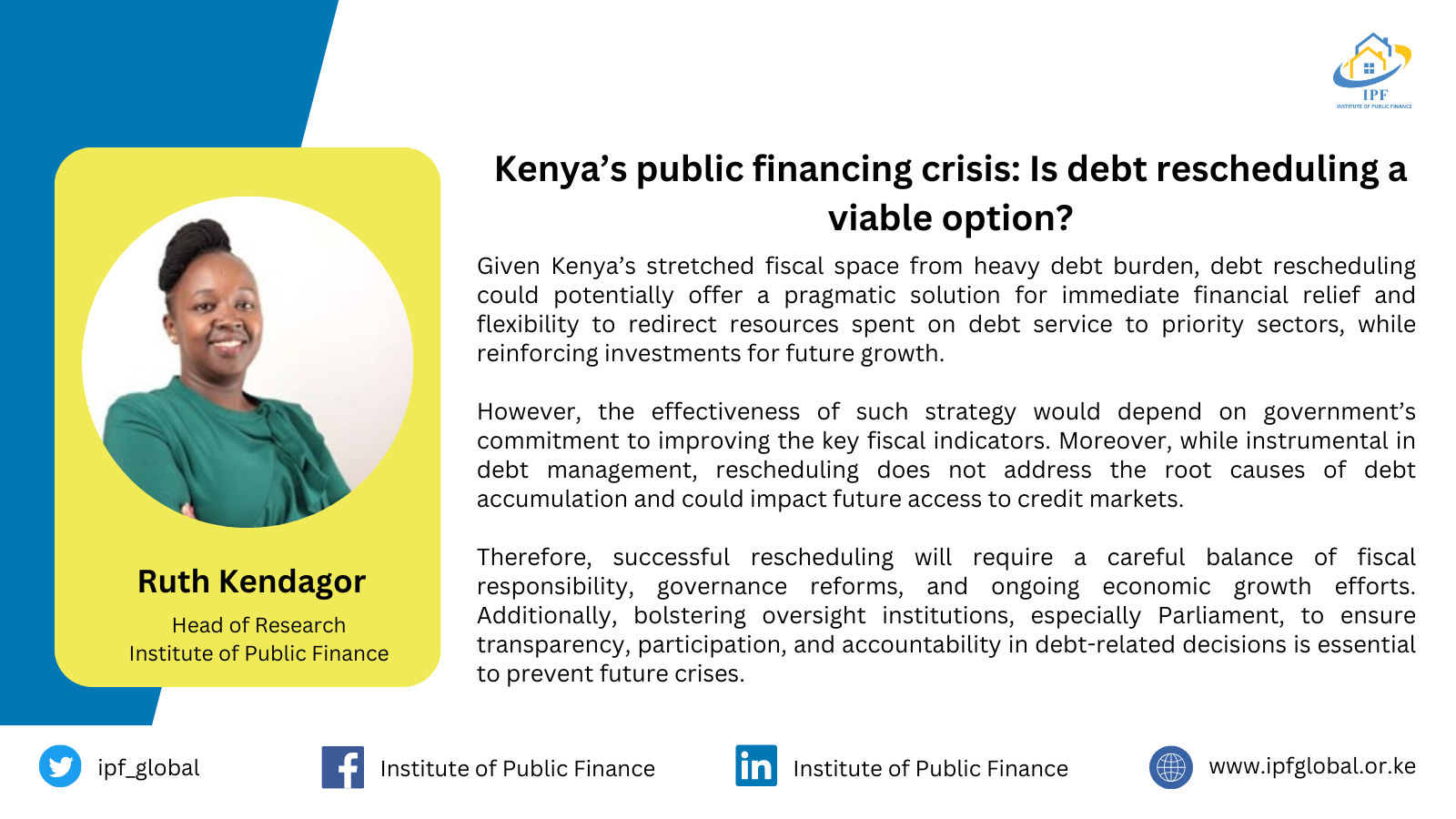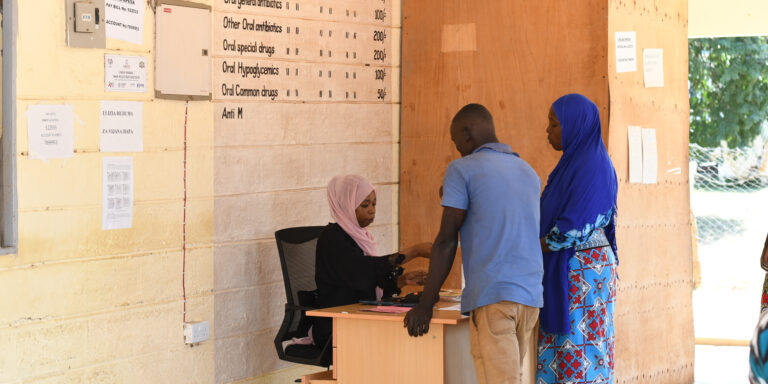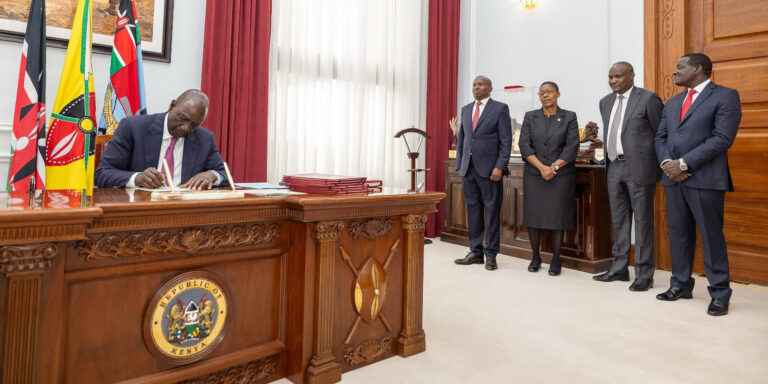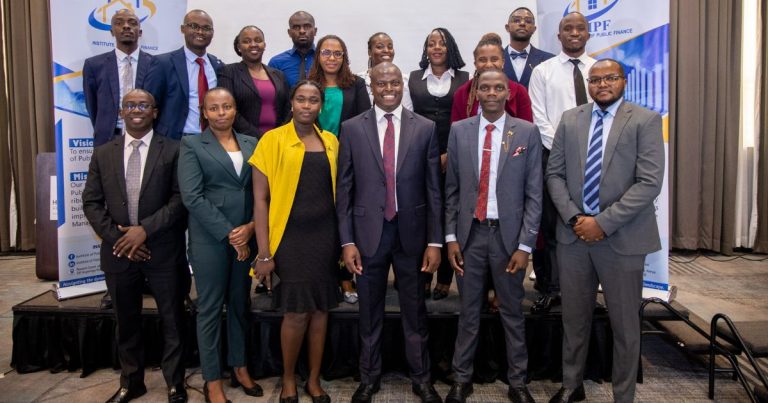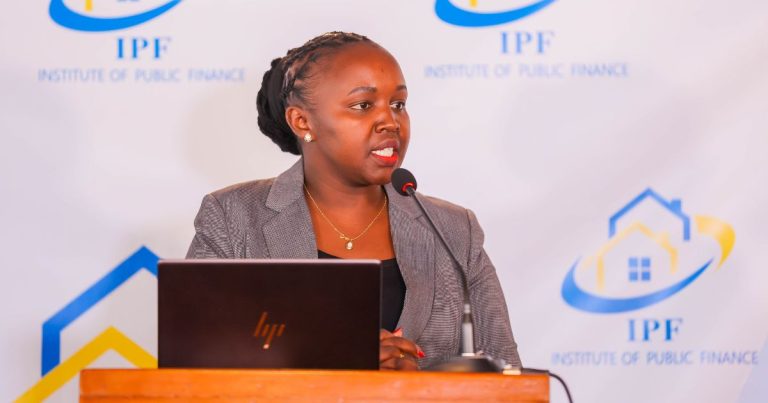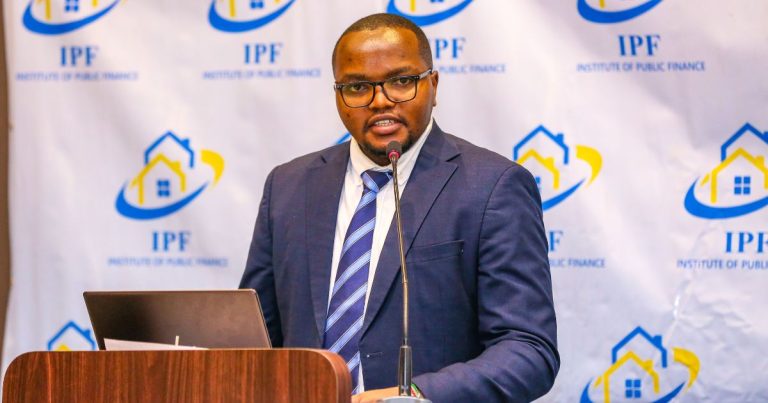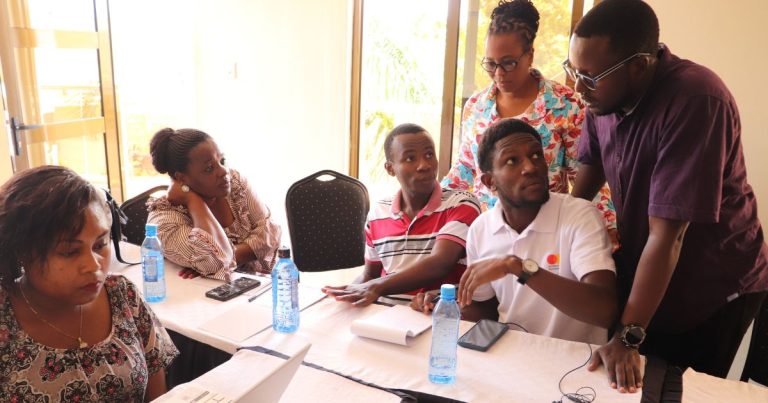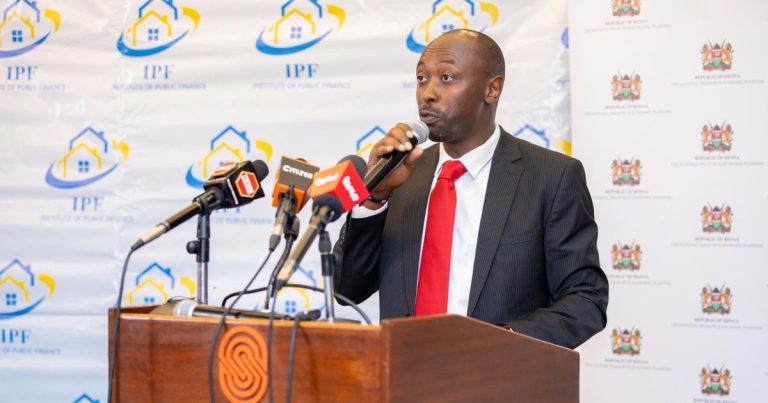Kenya’s finances are on the ropes, with more than 50% of tax revenue spent to debt servicing and a growing risk of debt distress. Adding to this pressure is the upcoming maturity of Ksh. 242bn Eurobond in February 2024 and an additional Ksh. 942bn over the next five years[i] [ii]. While the disputed Finance Act 2023 introduced higher taxation measures to boost revenue, this is not sufficient to address the debt challenge. Does Kenya need to consider more drastic alternatives?
Debt rescheduling is a policy tool that allows debtor countries to renegotiate debt terms with creditors, potentially extending repayment periods, reducing interest rates, or granting temporary debt payment moratoriums[iii]. By renegotiating its debt terms, Kenya can gain immediate financial relief, redirect resources to priority sectors, and lay the groundwork for future growth. However, debt rescheduling, while instrumental in debt management, does not address the root causes of debt accumulation and may affect access to credit markets in the future. Therefore, successful rescheduling requires a delicate balance of fiscal responsibility, governance reforms, and ongoing efforts to foster economic prosperity.
Although there is potential for debt rescheduling in Kenya, its success depends on government’s willingness to adjust its fiscal indicators. First, Kenya needs to raise adequate revenue to sustain new repayment plans and finance its development agenda. This is evidenced by IMF’s case-by-case analysis for rescheduling, which considers, among other indicators, continued availability of financing needed for long-term growth and development[iv]. Kenya’s tax reforms have gradually yielded revenue growth, from Ksh.1.5 trillion in 2017, to approximately 2 trillion in 2022. Whereas this is laudable, tax revenue-to-GDP ratio has stagnated, at 17 percent. IMF reports observe that for countries whose tax-revenue-to-GDP ratio is low, revenue-mobilizing approaches are essential for tackling public debt.
Secondly, the success of debt rescheduling depends on the willingness of creditors to renegotiate debt terms[v]. Some creditors may be reluctant to agree, complicating the process. Even when creditors agree to cooperate, rescheduling may happen on the creditors’ terms[vi]. If Kenya is to re-negotiate its debt obligations, caution must be exercised to secure the best possible terms. Studies have shown that debt restructuring involving coordinated mechanisms among different creditors are more successful. Zambia’s experience provides valuable insights, as it faced similar debt challenges, including a similar creditor profile comprising both official bilateral and private sector lenders. Under the G20 Common Framework for Debt Treatment, an Official Creditor Committee (OCC) was established, with China and France serving as co-chairs. This OCC successfully brokered a mutually agreeable compromise for all parties, including China.[vii].
Additionally, it is imperative for Kenya to improve its creditworthiness, which has declined in recent years from stable to negative in global agency ratings. Downgrades convey a negative message to existing and potential lenders, suggesting a higher risk of financial default. More specifically, for pre-emptive debt rescheduling (where outstanding debt is renegotiated before government misses any payments), the debtor country’s credit ratings could influence creditors’ decisions. Low creditworthiness may hinder favourable terms in rescheduling.
Improving Kenya’s credit ratings requires addressing factors that contribute to unfavourable assessments. Some of these factors require long-term reforms, but there are also more immediate steps that the government can take. These include ensuring consistent, timely, and trustworthy economic data, continued fiscal consolidation, boosting foreign reserves, and reducing dependence on domestic financing.[viii]. Although debt restructuring signals a country’s inability to pay, and could potentially impact short term credit rating, the UN Department for Economic and Social Affairs[ix] and the Africa Peer Review Mechanism[x] both note that enhancing dialogue and liaison between the credit rating agencies and governments could foster a deeper understanding of government policies, and close information gaps that often contribute to lower ratings, especially under circumstances of debt sustainability initiatives.
Finally, empirical evidence shows that strong debt management institutions and policies are important in public debt sustainability and mitigating the risk of sovereign defaults[xi]. Moving forward, Kenya needs to strengthen crucial areas of debt management and by extension, public finance management systems. Reschedule or not, Kenya’s oversight institutions such as Parliament should play a stronger role to ensure that debt decisions are transparent, participatory, and accountable, and that all resources raised are utilized efficiently, equitably and effectively. This will avoid such crises in the future.
[i] Budget-Summary-for-the-FY-2023_24.pdf (treasury.go.ke)
[ii] FIB_Kenya-Debt-Series-Report_10.03.2023.pdf
[iii] Debt rescheduling: what does it mean? in: Finance & Development Volume 20 Issue 003 (1983) (imf.org)
[iv] Questions and Answers on Sovereign Debt Issues (imf.org)
[v] Financial Crises: Causes, Consequences, and Policy Responses – Restructuring Sovereign Debt: Lessons from Recent History; Udaibir S. Das, Michael G. Papaioannou, Christoph Trebesch; August 2012 (imf.org)
[vi] How China lends: a rare look into 100 debt contracts with foreign governments | Economic Policy | Oxford Academic (oup.com)
[vii] Zambia: A template for debt restructuring? – Atlantic Council
[viii] Moody’s confirms Kenya’s ratings at B3, changes outlook to negative | Rating Action | Moody’s (moodys.com)
[x] KENYA-Tech-Support-Mission-on-Int-CREDIT-REPORT-sm.pdf (aprm-au.org)
[xi] https://www.emerald.com/insight/content/doi/10.1108/JFEP-12-2022-0294/full/pdf?title=unpleasant-surprises-debt-relief-and-risk-of-sovereign-default>

